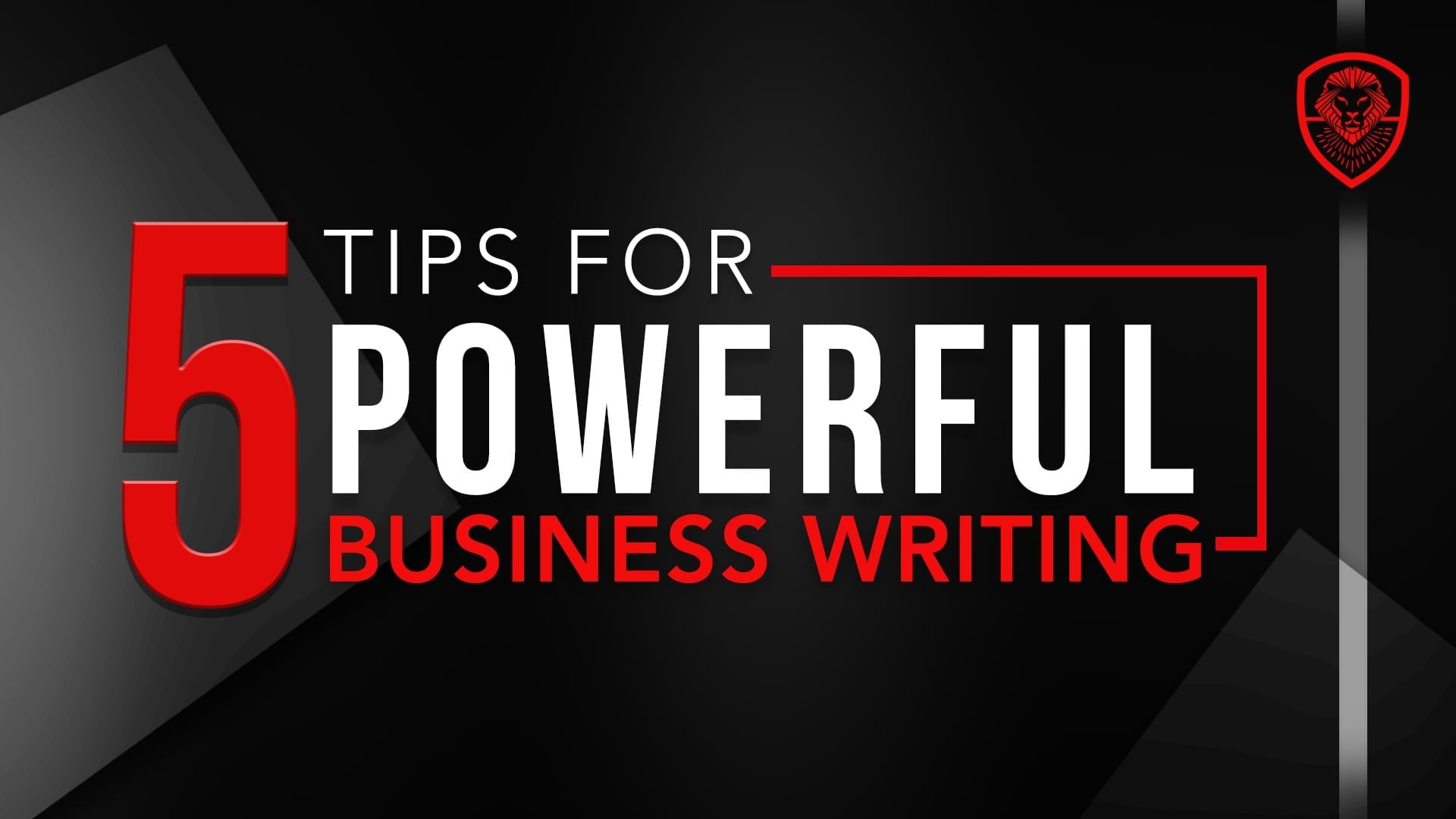 This article is by Rebecca Livermore. Rebecca is the content manager here at PatrickBetDavid.com and the author of The Blogger’s Quick Guide to Starting Your First WordPress Blog. She invites you to connect with her on LinkedIn.
This article is by Rebecca Livermore. Rebecca is the content manager here at PatrickBetDavid.com and the author of The Blogger’s Quick Guide to Starting Your First WordPress Blog. She invites you to connect with her on LinkedIn.
If you're an entrepreneur, you write. This is true whether or not English is your first language, you have a blog, or have authored books. For instance, even if you don't consider yourself to be a writer, you still write email, social media posts, etc. And like it or not, your writing has an impact on your bottom line. So in this article, I get into five tips for powerful business writing.
#1: Use Words Properly
One of the most important lessons when it comes to business writing is the proper use of words. The meaning and use of some words are obvious. Others, not so much. This article published on Entrepreneur.com explains the ins and outs of the following words:
- All right vs. alright
- Cache vs. cachet
- Can vs. may
- Compliment vs. complement
- Cord vs. chord
- Fewer vs. less
- Forwards, backwards, towards, outwards, onwards, etc.
- Home in vs. hone in
- i.e. vs. e.g.
- Imply vs. infer
- Founder vs. flounder
- Lead vs. led
- Leapt, burnt, dreamt, knelt, etc.
- Premier vs. premiere
- Sneaked vs. snuck
To read the explanations regarding each of these words, check out this article, BUT before you do, I have a brief warning. The article assumes the readers are Americans. Because of that, some of the advice is slanted toward American English. If you are British, or are in a country where British English is the norm, take some of the advice with a grain of salt. However, you also need to keep in mind your target audience. For example, if you're in the U.K. or another country where British English is the norm, but Americans are your target audience, use American English.
By the way, if you want an even easier quick fix to your writing, be sure to check out this article published on Inc., How to Radically Improve Your Writing in Under 2 Minutes.
#2: Write a Book (or Not)
A lot of times people have a romanticized idea when it comes to writing a book. While it's true that many authors are creative types, many books are written by people who specialize in something other than writing, such as entrepreneurship. That's good news, because even if you're not a writer in the traditional sense of the word, if you're an expert in some area, writing a book is a great way to share your expertise. Books are also a great way to establish yourself as an expert. Also good news is the fact that nowadays, self-publishing is considered a viable option. As this article published on Inc.com states,
In recent years -- thanks in part to the rise of different publishing options -- authorship is no longer limited to those who were lucky enough to get a book deal. In fact, the business book has become a symbol of author expertise, and authors have been successfully employing their books as tools to grow their own businesses.
The article goes on to provide some insight into whether or not writing a book is an aspect of business writing that's best for you.
Speaking of books, check out Patrick's Amazon author page here.
#3: Master Self-Editing
This article published on Copyblogger provides the following tips for self-editing your blog posts:
1. Become the Editor-in-Chief of your blog
2. Build editing momentum
3. Bond with your audience over a shared worldview
4. Sleep with one eye (and one ear) open
5. Ask yourself questions
6. Add carbonation to your flat water
7. Bring an umbrella (just in case it rains)
8. Complete a “revision triangle”
9. Keep the reader in your created reality
10. Zig when others zag
To understand what each of these points mean, be sure to read the entire article here.
I also share my own self-editing process in this article. The tips I share are for self-editing books, but they work for any type of business writing.
#4: Write Better Ad Copy
This article published on Entrepreneur.com provides the following five tips for writing better ad copy:
Step #1: Get a printout of the names and addresses of your customers and best prospects, and then sit down and read that printout.
Step #2: Look at the mail you receive from your customers.
Step #3: Start reading your mail, and start taking phone calls from your business customers.
Step #4: Start making telephone calls to your customers.
Step #5: Go to where your customers live, knock on their front door and ask to talk to them.
All of these steps have to do with really getting to know your customers, and the impact that has on your ability to write powerful advertising copy.
As the article states,
Advertising expert Gary Halbert once said that deliberately trying to be clever and creative, to “dream up” an ad that would work, was a very dumb way to approach writing. You couldn’t possibly make up something in your head that would work. Really great copywriters are willing to “become intimately involved” with the people they’re trying to sell to.
So rather than trying to impress people with your wit, get to know the very people you want to make an impression on. For full details, you can read the article in its entirety here.
#5: Journal
Keeping a journal may seem like the last thing you want to do when it comes to business writing. But believe it or not, it can have a big impact on your overall life, including your business. This article published on Addicted2Success gives the following four benefits of keeping a journal:
1. You journal to reconnect with yourself and your purpose.
2. You journal to connect with spirit.
3. You journal to tap back into your emotions.
4. You journal because it can be used to change your state/mood.
At first glance these four benefits of journaling may seem to have nothing to do with being an entrepreneur in general or business writing in particular. But consider the following quote from the article:
“A personal journal is an ideal environment in which to “become”. It is a perfect place for you to think, feel, discover, expand, remember, and dream.” – Brad Wilcox
Now think about the impact that your dreams have on business. Consider how much more powerful you write - or do anything for that matter - when your dreams are alive. Keeping a journal will bring you back to the dreams and desires deep inside you that you may lose touch with in the middle of the busyness of running a business. So while it may seem like you don't have time to journal, the reality is that you may not have time to neglect it.
So there you have it, five tips for powerful business writing. If you have any tips of your own, be sure to share them in the comments below.







